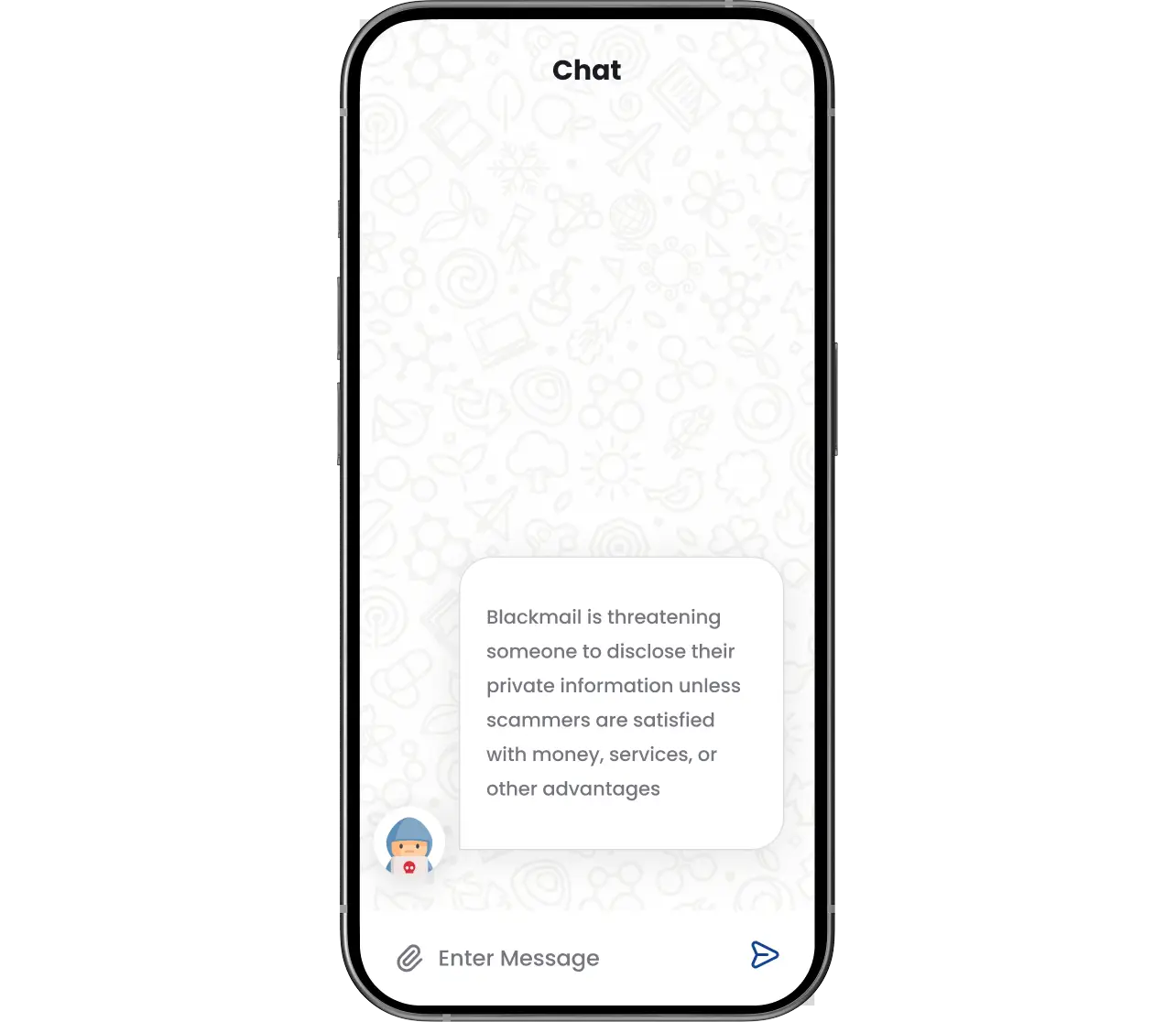
Blackmail Meaning: How to Recognize and Prevent It
Online blackmail is a grievous crime initiated through coercive disclosures of very sensitive information or causing harm unless demands are met. Understanding its tactics is crucial to avoid becoming a pawn and preventing this form of coercion.

Key Takeaways
-
Understand that blackmail is a criminal act, and you are liable to face serious legal consequences if found guilty.
-
Recognize the signs to protect yourself if you're a victim of blackmail.
-
Learn how internet blackmail and blackmailing online are executed so you can be two steps ahead of blackmailers.
-
Explore the various forms of blackmail and online blackmail scams, including digital blackmail.
-
Discover the common blackmail steps and methods behind cyber blackmail.
What does Blackmail Mean?
Blackmail is an illicit method of threatening to reveal a victim's sensitive information unless demands are met, making it an intolerable offense in all jurisdictions worldwide. The definition of blackmail involves using fear to manipulate victims, and many ask, "What does blackmail mean?" The 21st century Blackmail has adopted several forms, such as; internet blackmail, cyber blackmail, and digital blackmail, to suit perpetrators' misdeeds and make it easier to exploit people into giving up something valuable in exchange for their sanity and reputation.

Blackmail Statistics
Research from 2020 to 2025 shows a great increase in all types of online blackmail, including cyber blackmail and digital blackmail. The data on blackmail shows that about 90% of victims are men and 10% are women, with younger adults susceptible to blackmail scams and crimes.

Blackmail Examples
Technological innovations have been very pivotal to the existence of online blackmail in different forms, including; digital blackmail and internet blackmail scams. Examples of online blackmail include extortion, sextortion, catfishing, and webcam takeover.

Elements of Blackmail
Blackmailers often follow specific patterns of behavior to manipulate their victims. Recognizing these warning signs can help you protect yourself from coercion.
Threats of Revealing Sensitive Information
A blackmailer may threaten to disclose personal, financial, or embarrassing details to force compliance. These threats often exploit fears of public exposure, professional damage, or personal relationships being harmed. The intent is to create a sense of urgency and vulnerability in the victim.
Persistent Contact
Repeated messages, calls, or demands are common tactics used to maintain pressure. A blackmailer may refuse to accept boundaries, constantly reminding the victim of the potential consequences of non-compliance. This persistence is designed to break down resistance and ensure the victim feels trapped.
Anonymous or Hidden Identity
Many blackmailers operate under a veil of secrecy, using fake accounts, anonymous messages, or concealed phone numbers. They may refuse to disclose their real identity, making it difficult to trace them. This anonymity allows them to manipulate from the shadows, increasing their perceived power over the victim.
Attempts to Isolate You
A blackmailer may try to discourage you from seeking help, warning against involving friends, family, or authorities. They often claim that seeking support will worsen the situation, fostering secrecy and dependence. This isolation makes it harder to challenge their control and find a way out.
Pressure to Act Quickly
Creating a sense of urgency is a key manipulation tactic. Blackmailers often impose tight deadlines, warning that delays will lead to immediate exposure or severe consequences. This pressure is meant to prevent rational decision-making and force the victim into compliance before they can seek advice or support.
Real Blackmail Cases
Blackmail, a criminal act involving threats to reveal sensitive information unless demands are met, manifests in various forms across different contexts. The following real-life cases illustrate the diverse tactics employed by blackmailers and the profound impact on their victims.
“
After a hacker breached my social media, I became a victim of blackmail. The blackmailer demanded money to keep my personal conversations private. In panic, I paid. Months later, the demands escalated, leaving me no choice but to seek help from the police.
Online Ransom Threat: Marcus Facing a Relentless Internet Blackmail Scheme
19 Feb 2025
“
I never realized I was being manipulated until it was too late. A scammer threatened to expose fake nude images unless I paid. Fear and shame controlled me, and without recognizing the blackmail tactics, I kept paying to keep my reputation intact.
Social Media Manipulation: Linda's Struggle with Digital Blackmail
12 Jan 2025
“
I received threatening emails from someone claiming to have private videos. Knowing online blackmail tactics, I stayed calm and confided in a friend. Together, we gathered evidence and reported the scam to legal authorities, ultimately putting an end to the ordeal safely.
Keisha's Private Video Leaks Scandal
14 Mart 2025
Is Blackmail a Crime?
Blackmail is a manipulative crime triggered by coercion, fear, and exploitation. It can occur in either personal relationships or workplaces, and its adverse effects extend beyond individual victims to society as a whole. When encountering internet blackmail it's important that you know how to deal with online blackmail, which involves documenting evidence, reporting incidents, and seeking legal advice. Blackmail scams create an unsafe digital environment where people fear sharing information or engaging in online interactions, thereby causing authorities to intensify efforts against blackmailing online to protect victims from this invasive abuse of power.
How to Avoid Blackmail
Here are essential steps to safeguard yourself from cyber blackmail:
Limit Personal Information Sharing
Be cautious about what you share online, as blackmailers often exploit sensitive data found on social media or messaging platforms
Strengthen Privacy Settings
Regularly update privacy settings on social media and online accounts to restrict who can see your personal information
Use Strong, Unique Passwords
Protect accounts with strong passwords and enable two-factor authentication to prevent unauthorized access.
Avoid Interacting with Suspicious Messages
If someone contacts you with threats, do not engage. Instead, document everything and seek professional guidance.
Report Blackmail Attempts
If you become a victim of blackmail, report it to the appropriate authorities or platforms to stop online blackmail attempts
Do Not Give in to Demands
Paying or complying often leads to more threats rather than stopping the blackmail scam
Seek Legal Support
If blackmail persists, consult legal professionals to explore ways to rid yourself of blackmail safely and effectively
What to Do if Being Blackmailed
Stay Calm
Avoid panicking to think clearly and make informed decisions
Do Not Comply
Refrain from giving in to the blackmailer's demands
Preserve Evidence
Keep all communications and relevant materials intact
Seek Support
Confide in trusted friends, family, or professionals
Report the Incident
Contact law enforcement or appropriate authorities promptly
Report Blackmail
Are you a victim of blackmail who has no confidant? Here are six trusted services available for you to report blackmail online and seek professional assistance to combat internet blackmail

A dedicated platform that specializes in online blackmail helps and protects your digital privacy.

Specializes in internet blackmail, helping victims track down and counteract cyber blackmail threats

A legal firm that allows victims to report blackmail online and take necessary action against blackmail scams.

A federal agency where U.S. victims can report blackmailing online and cyber extortion cases.

Provides resources and expert support to help individuals fight against online blackmail reporting.

Offers cyber investigation services to uncover and stop internet blackmail attempts effectively.
How We Can Help
Your mental health is of utmost importance to us. Share your ordeals with us. Our 24/7 blackmail helpline emergency service is dedicated to every victim of blackmail. We respect our clients privilege and handle internet blackmail cases professionally and discreetly. Our specialty includes combating internet blackmail and cyber blackmail and exposing blackmail scams to stop online blackmail. Trust our team to safeguard you against the rising tide of blackmail crime
Are you under attack? We can help
Are you a victim of online blackmail, who seeks professional help?
Get HelpFAQ
Is blackmail a crime?
Yes, blackmail is a punishable offense by the law in all jurisdictions, especially in the U.S. It is a criminal act that thrives on coercion and threats of revealing sensitive information to damage the victim's prestige and reputation. Victims have every right to pursue justice by reporting and consulting legal professionals to protect their violated rights.
How to deal with blackmail?
Facing blackmail can be overwhelming. You have to be strategic because once you snooze, you lose! Stall the blackmailers and do not succumb to demands immediately. Gather digital evidence and document every communication. Reach out to trusted law enforcement agencies and seek advice from legal or cybersecurity experts who can guide you in countering the threat effectively and safely.
How to report blackmail online?
Reporting blackmail online is vital to ending blackmail stunts. If you must report blackmail online, you must organize all relevant documents that serve as digital evidence carefully. These include chat logs, screenshots, and emails. Then, submit them to your local cybercrime unit or trusted online reporting platforms.
What is the difference between blackmail and extortion?
Blackmail and extortion are mostly used interchangeably because they both involve coercion. Blackmail specifically involves threats to expose sensitive information, whereas extortion may include threats of physical harm or property damage. The nature of the threats could warrant investigation and legal charges.
What can the police do about blackmail?
If you are a victim of blackmail, report the case with concrete evidence to the police so they can build a case and press charges. The police have the resources to collaborate with cybercrime units for technical intervention to help narrow down the perpetrators, arrest them, and ensure justice is served.
Table of Contents
Get Help Now!
Blackmail is threatening someone to disclose their private
Get Help Call: (317) 643-6483